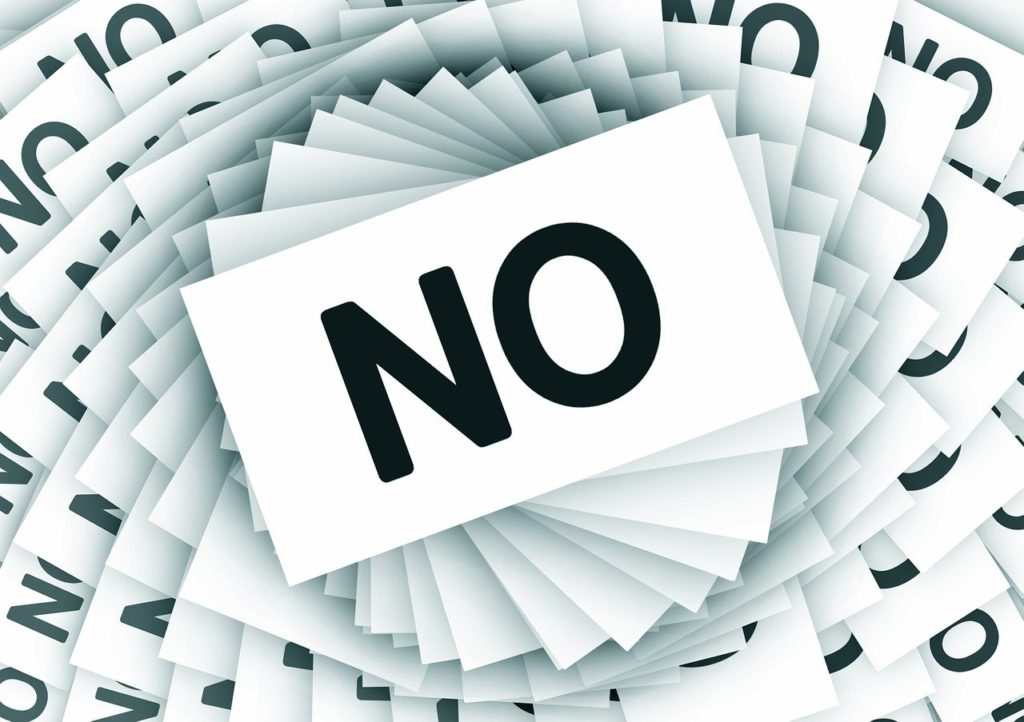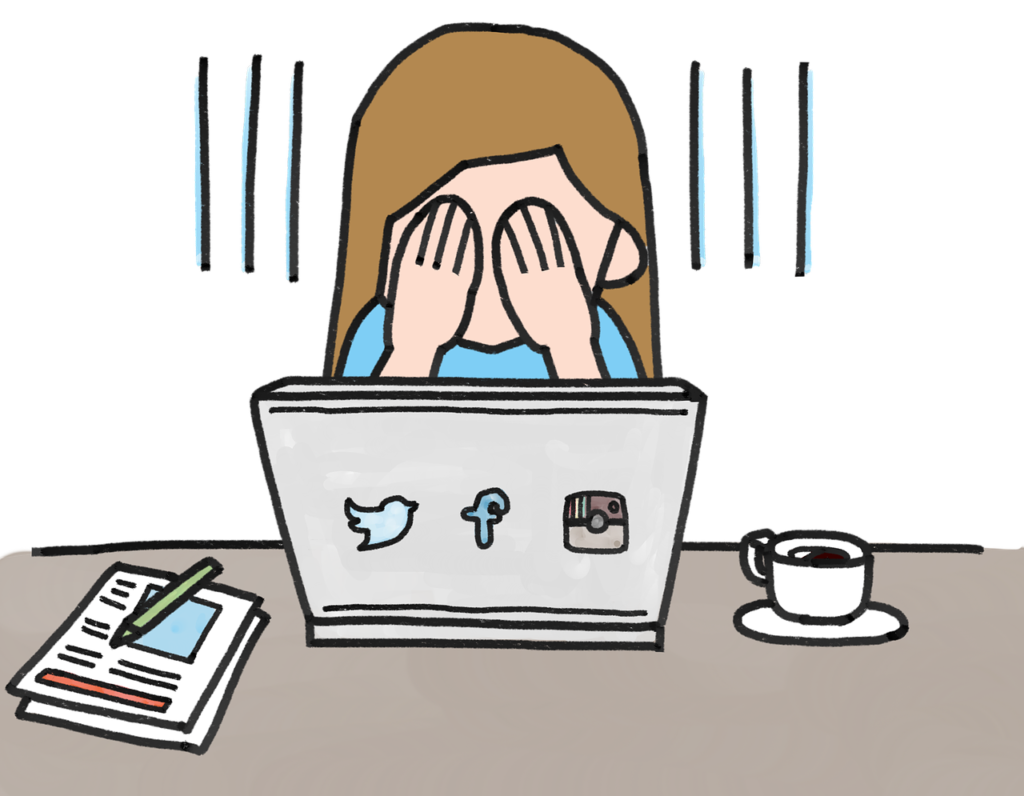Rejection. It’s something all of us have to deal with in our life no matter who we are or what career we are in. Some careers are worse than others. As a wildlife biologist, I am in one of those careers.
When I was in college, I actually wanted to be an actor. I was so scared of all of the rejection though that I tried to mentally prepare myself even before I really got started in this career. After hearing story after story of talented, thin, and beautiful actors getting rejected over and over again, I wasn’t sure if I could take it all.
I obviously ended up in a different career, but ironically, in my career as a scientist, I deal with rejection over and over again. I just didn’t know how much of it there was before I started.

In science, your research is funded through grants which frequently have rejection rates of ~90%, jobs are competitive with sometimes hundreds of people applying for a single position, and when you submit a manuscript, you might not only get a rejection, but a list of criticisms about what’s wrong with it. In other words, rejection is a major part of science.
As a result, over the years, I’ve learned to face rejection head on, whether I wanted to or not. Maybe in my early days, I would cope by eating a pint of ice cream and crying away the day, but now my skin is now thick and I rarely have a strong emotional reaction.
Being on the job market for several years has especially made me have to cope. I’ve been the second choice over and over again for jobs I fell in love with.
There is some aspect of “getting used to it” that helped me deal with rejection, but most of it has been a shift in mindset. Here I share with you my tips to help you not only cope with rejection, but welcome it (yes, welcome it!).
1. Think of Rejection as The First Step
My first tip comes from my late committee member, Ray Semlitsch. I had a meeting with him right after the first manuscript I submitted on my own was rejected by the first journal I sent it to. I told him the news, expecting him to be disappointed in me, but all he said was “good.” I was shocked.
“How is this possibly good?” I asked.
“It’s the first step” he said.
As an experienced scientist, Ray knew what I know now: rejection is just part of the game in science. In fact, he was proud of me for getting through that first step: submitting a paper to begin with. Afterwards we had a thoughtful discussion about which journal I was should submit to next.

I felt so good coming from that meeting. I learned that not only is rejection just something you have to deal with in science, but viewing it as the first step made me feel like I moved forward in my research rather than backwards. It allowed me to easily move on and go to to the next step.
2. Rejection Can Help You Improve
If your rejection comes with feedback, this is great material for you to work with to improve yourself. If you don’t get a job, you can ask for feedback that may help you get the next one.
This advice is especially useful for grant writing. Scientists often submit the same grant proposal idea multiple times to an agency like the National Science Foundation. Each time the grant is reviewed, the reviewers give the submitter feedback. They can then rewrite it and resubmit with a better, revised version. Getting rejected is honestly expected for a first-time submitter and is viewed as a great way to get closer to getting one.
3. Every Rejection Has Led Me to a Better Path
It may not seem like it at all when you get the rejection, but I promise you that your rejection is taking you closer to better things. This may sound crazy, but hear me out.
One job rejection particularly stands out to me. It was for a job that I really wanted and was perfect for. It was exactly where I wanted to live, I could continue my research on forest elephants and still do outreach, which I love. I imagined myself in the position and how I had found my dream job.
But despite being seemingly perfect for it, I was choice number two. Someone with ten years of experience more than me got it instead. There was no way I could compete with that.

At the time, it was devastating, but now, six years later, I can see that it has led me here to exactly what I want to do, which is science communication professionally. If I had been in that job, I would have never developed my blog and I would have missed out on so many opportunities that I had with my amazing postdoc at eMammal. In my postdoc, I got to retrace the footsteps of of Teddy Roosevelt on an expedition to Mount Kenya, and go to India, Mexico, and Suriname for research.
My postdoc also gave me incredible experiences in science communication. I got to make videos and be on TV shows like What on Earth. I don’t know if I would have been able to pursue all of those opportunities had I got the job I wanted.
I used to mourn for the jobs I really wanted and didn’t get, but what I learned is that not getting those jobs was the best thing to happen to me. Through the absence of a permanent job, I found my real love, which is blogging and science communication. And through some happenstance way, I also figured out how to make a living out of this. Now I am grateful for all of the job rejections that I’ve received.
4. Rejection is Evidence That You are Doing Hard Things (Which is Good!)

This tip was inspired by this quote. (I tried to fact-check it, but I couldn’t find an exact match. So I’m not sure if Richard Branson even said it, but I regardless, I still love it.)
When you get rejected, it means you are doing hard things! You could be playing it safe in life by not shooting for the better academic journal or not trying for a competitive grant, but it won’t really get you anywhere. Hard things make you a stronger and smarter person. The next time you get rejected, pat yourself on the back for taking a shot at something difficult.
5. A Lot of It is Pure Luck
With the odds being ever not in your favor, it’s important to remember that a lot getting a job or grant is luck. I know this sounds like an excuse or a cop-out, but it’s true. This was a tweet that became popular in #ScienceTwitter.
Honestly I can't understand why this is making the rounds as an inspirational story. It just screams "The whole publishing system is arbitrary nonsense" to me https://t.co/GIWHN4KZKX
— Point Mutation (@Point_Mutation) October 12, 2019
It’s a rejection letter from the prominent journal Nature. The same scientist’s work that was rejected by Nature later won a Nobel Prize.
So much of science is really is someone’s opinion of your work: peer reviews of grants and publications. Yes, there are definitely good studies and bad studies that need to be rejected, but there is a lot of grey area. It’s kind of like on Project Runway when you think an outfit looks like garbage, but the judges love it.
Some reviewers are nicer than others. It’s a crapshoot who you get and the same manuscript submitted to different journals can have widely different reviews. The reviewers can even greatly disagree with each other even with the same manuscript submission to a journal because they review your manuscript individually without seeing each other’s comments. I’ve literally had reviews where one reviewer told me the writing is excellent and another reviewer telling me to have it proofread by a native English speaker (even though I am a native English speaker).
During graduate school, one of my colleagues in the lab next door to mine got the coveted Graduate Research Fellowship from the National Science Foundation. He said a lot of it was luck, and he’s right. While he did have a fantastic application, there were others that were just as worthy as his and a lot of it comes down to what strikes the reviewer as exciting or new or what they just like.

There are also quotas to fill in grants or jobs. For example, in the L’Oreal for Women in Science fellowship, they choose just five women out of the thousands that apply. All of the winners can’t be from the same field of science, so hopefully yours is the one that shines. This isn’t to say that the winners aren’t deserving, but that there are applicants who are equally deserving with similar qualifications to the winners, but they simply don’t have enough awards to give them.
A rejection from a grant, manuscript, or job doesn’t mean that you aren’t good enough, it could be that luck is not on your side. In other examples, I know people who got professor positions through spousal hires or because the first choice declined the offer. Some did not get jobs because they wanted a specific type of research or the research to occur in a specific region even though this information was not listed in the job posting.
6. Use Rejection as Motivation!
The last time I was rejected from something, I was initially really angry because it was something I was SUPER qualified for, so much so that I exceeded the expectations. It was for a program to encourage middle-school aged girls to go into STEM careers. Here I was, having worked with teachers for five years developing middle school curricula based on our real citizen science research that kids participated in, and I got rejected.
“Sitting down and spending time with your rejection letters to make a craft out of them is kind of therapeutic” | @kirbycai @washingtonpost https://t.co/sLwi9LlJeO
— Shit Academics Say (@AcademicsSay) October 27, 2019
I initially was mad, but I quickly turned it around and decided to use it as motivation to prove that they made the wrong choice. When someone says you can’t do something, it can make you want it more.
Although this isn’t a story of rejection, when I was in college, I was told I wouldn’t pass physiology class, a class that was known for being super hard, unless I took the lab (which was optional). I didn’t want to cut the heads off of turtles (something you really had to do in the lab), so I was determined to do well in the class to prove them wrong. I ended up getting the best grade in the class because of my determination and saved a turtle’s life.

7. Call for Support
I believe it’s important to have positive, supportive people in your life, especially outside of the sciences (see my tips for Impostor Syndrome too). A lot of times when something negatively affects us (like rejection), we lose a sense of our worth and accomplishments.
In academia this can be especially hard because everyone is so accomplished. It’s so easy to compare yourself with others in terms of publications, grants, and awards. And if you go on social media, you can feel even worse.
After I got rejected from a fellowship that I applied for, I called my dad and my nephew was there too. They both reminded me of things that I have done that I am proud of inside and outside of my career as a scientist. Talking to them also made me realize that I am so lucky, and even though this was upsetting to me, in the scheme of things, it was a minor loss. Sometimes you just need to make that phone call or go out with your friends!
If you don’t have any non-science friends or a supportive family, try Meetup. I met all of my friends here in Raleigh through it, many of whom are incredible and positive people. I’m the organizer for two different groups: one dedicated to blogging and another towards making female friendships.
8. Say Thank You
Another piece of seemingly crazy advice comes from Oprah. I listen to her podcast and on one she was telling a story about how she was really upset about something and called Maya Angelou, her now passed close friend for advice and comfort. She was so upset in front of Angelou and could not stop crying.
Angelou, in all of her wisdom, told her to stop. Then she told Oprah to say thank you. She told Oprah to say thank you out loud and for specific things that she had. Oprah was so annoyed. How could she be thankful when this horrible thing had happened to her?
But she listened to Angelou and did what she said. And she started to feel better. The truth is, you can’t feel angry, sad, or upset when you genuinely feel gratitude. If you are really focused on what you are grateful for, you just can’t!
Human beings have a negativity bias. People are much more upset to lose $20 than we are to find $20 randomly on the ground. We are constantly searching for the negative, which has served us well in our evolutionary history: Where are the tigers? When is the fruit ripe? What if I don’t kill an animal during this hunt? But in today’s society, a lot of those needs are met so our mind naturally searches for other things that are wrong.
Practicing gratitude really helps us understand what is important in life. On another day, when I was upset about something coming from a hard day at work, I started to drive home. The podcast that came on was again Oprah’s and this time she was talking with a Holocaust surviver. I immediately felt grateful for my car, my clothes, being able to go to my home, and everything else I had in life. It reminded me of the truly important things in life.
If you need help cultivating gratitude, I find this Tony Robbins exercise helpful:
9. You Are in Good Company
Sure, you may feel like a total loser for being rejected, but would you think J.K. Rowling is a loser? Einstein? Steve Jobs?
All successful entrepreneurs, inventors, scientists, and more all have their rejection stories. You are in good company. Relish in that.
10. Treat Yo Self with Self Care
Take some time to take care of you! Someone asked recently on Facebook, “How do you do self care?” She honestly had no clue.
To me, self care is taking the time to take care of myself in all aspects: mental, physical, emotional. Here’s some of the things I do:
- Meditation
- Exercise almost every day
- Walks in nature (for the dogs too LOL, but I notice a big difference in my mental state when I skip nature for awhile)
- Stretching
- Foam rolling my body
- Massages
- Self help books
- Watching shows I like (right now I’m watching a RuPaul’s Drag Race marathon)
- Making time for friends
- Buying and making nutritious food
- Saying no to things I don’t want to do that won’t help me
- Resting when I need to (sometimes saying no to things I do want to do)
- Organizing
- Decluttering
- Painting
Take a short break from your normal schedule and work in some time for you.
QUESTION: How do you make yourself feel better after you’ve just had a rejection? (e.g. job/school etc)
— Dr Esther Odekunle (@EstOdek) April 15, 2019
I’ll start.
Food. Chinese food. And a funny TV show to help me escape from reality for a little while.
11. Feel it Out
This may sound like the opposite to the tip above and it kind of is. Don’t try to suppress your emotional response to your rejection, let yourself feel it out, but the caveat is, don’t let yourself stretch it out to days or weeks or months.
Set a timer and give yourself five minutes, maybe ten, maybe 15 if you really need it. But use this time to REALLY feel it. Cry your eyes out. Scream. Curse. Do whatever it takes to get out your sadness, anger, and rage. Five minutes is actually a long time to express intense emotions like this consistently. Feel it out and then let it all go when the timer is up and move on with your life.

Those are my 11 tips! You do not have to implement all of them (although you can if you want!). Hopefully at least one struck a cord with you and works. If not, I guess there’s always ice cream.
Love this post? Share it with friends!






